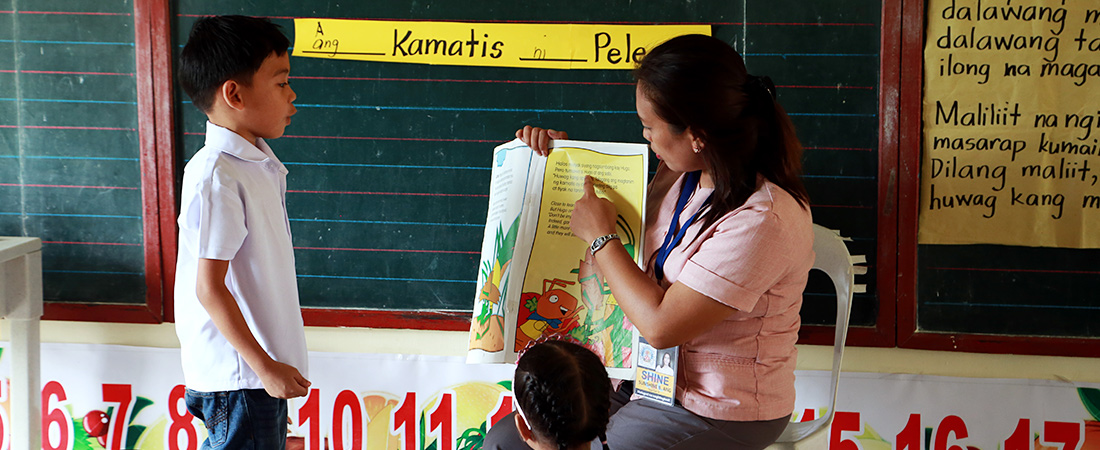A New Approach to Literacy in the Philippines

A teacher at the Tubburan Elementary School in Ilocos Norte reads to first graders using books provided by Basa Pilipinas. Photo: Chris Leones
As principal of the San Pascual Elementary School in Ubay, Philippines, Maria Jeana Polinar is committed to creating an environment where every child learns to read. Classrooms at her school have cozy reading corners stocked with books. Students learn to read and write in Visayan, their mother tongue, as well as Filipino and English, and there are remedial reading and writing classes for students who need extra help.
Polinar has even instituted a “zero non-reader” policy in her school to help teachers stay laser-focused on literacy instruction. “Reading is the foundation of learning,” she says. “There is no learning at all if a child can’t read and comprehend.”
Polinar’s approach is a remarkable departure from how literacy used to be taught in the Philippines. For decades, teachers taught exclusively in Filipino and English—even though most children spoke one of the Philippines’ 19 major local languages at home. But this changed in 2012 when the Philippines government passed a wide-ranging education reform bill that, among many changes, adopted mother tongue instruction for kindergarten through grade 3.
Implementing this new policy has been a huge undertaking for the Philippines Department of Education (DepEd)—but its partnership with EDC through the USAID-funded Basa Pilipinas program has delivered noteworthy results. Since 2013, Basa Pilipinas has improved literacy instruction for 1.8 million students in over 3,000 schools. DepEd is now preparing to roll out Basa’s approach and materials to every primary school in the country.
Mother-tongue instruction
After Polinar received training, she became a master trainer herself, leading workshops that reached hundreds of other educators. She taught teachers how to help children learn to read in their mother tongue, as well as how to help them bridge those languages and Filipino and English.
This shift from instruction in Filipino and English to teaching in students’ mother tongue has made a significant difference for young learners, says Polinar.
“[Children] find it easier to discuss things because they are using the mother tongue language, which is our own dialect,” she says. “The pupils are responsive and participate in the class discussions because they are able to express themselves freely and confidently and can relate well to the lessons.”
A recent study found that second-grade students who acquired a mother tongue foundation in Basa Pilipinas classrooms could read more fluently in Filipino than a similar cohort four years earlier who did not. The study also showed substantial gains in reading comprehension, with current students’ performance on a comprehension task 14 percent higher than that of a previous cohort.
This doesn’t surprise EDC’s Rachel Christina, a literacy expert who has studied the impact of mother tongue instruction on early literacy learning.
“We know that mother tongue instruction improves literacy outcomes,” says Christina. “Basa Pilipinas is showing that mother tongue instruction can also work at scale to help students transition effectively into literacy in languages that are less familiar, especially when you have a partner like DepEd, which has shown itself to be truly committed to the effort.”
More authentic materials
Another challenge the project addressed was the fact that most classrooms didn’t have any books in the local mother tongue, limiting opportunities for students to practice reading.
So Basa pulled together a team of local illustrators and writers to produce reading materials. This effort yielded 40 picture books for kindergarteners in two different languages: Sinugbuanong Binisaya and Ilokano. Staff also wrote leveled readers and read-aloud books for students in grades 1-3. In all, the project has distributed 1.4 million reading resources to schools.
“Before Basa, there wasn’t much opportunity for independent reading or communicating about what you read in public schools,” says EDC’s Cecilia Ochoa, deputy chief of party for the project. “We were able to introduce literature-based materials that provide a more authentic literacy experience for students.”
These materials are now available to teachers all across the country. And, with Basa coming to a close, DepEd is leading an effort to create more books, readers, and classroom materials in the Philippines’ other mother tongue languages. The result is the potential to improve mother tongue-based education for millions more Filipino children.
“This partnership has shown that a mother tongue-based education policy can bring about real literacy gains,” says Ochoa. “DepEd’s multilingual approach to literacy works when teachers and classrooms are well supported. The young learners who can now read in their mother tongue, Filipino, and English are the best testament to Basa’s success.”